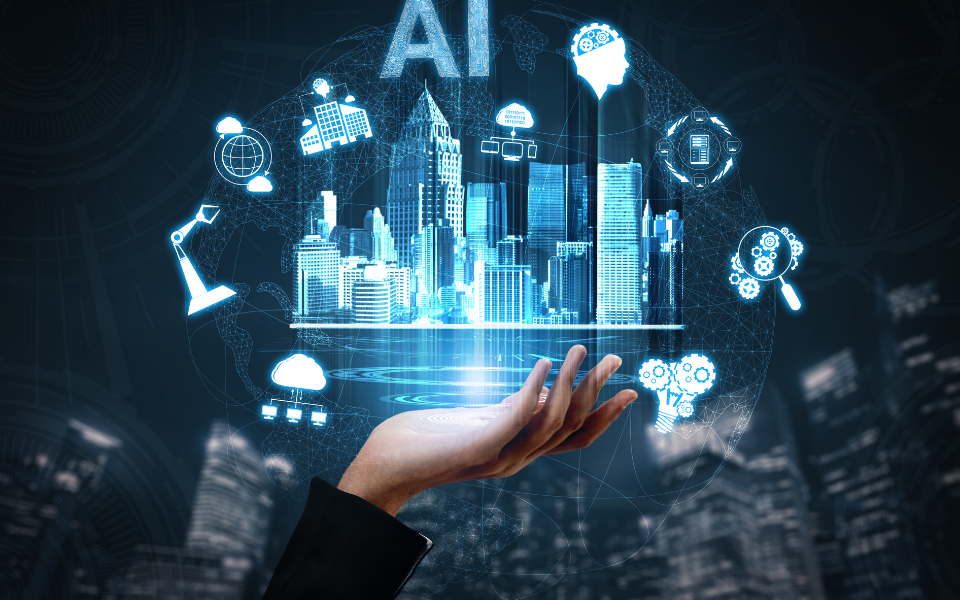
4 Ways AI is Transforming Human Resources: Revolutionizing the Workforce
Share

Artificial Intelligence (AI) is no longer a futuristic concept—it's a transformative force that’s already reshaping various industries. With applications spanning across healthcare, retail, automotive, and more, AI's capabilities to learn from data and automate repetitive tasks are revolutionizing the way businesses operate. The AI market is forecasted to reach $177.31 billion by 2030, growing at a CAGR of 47.2% between 2020 and 2030. This rapid growth highlights the undeniable potential for AI to change the landscape of many sectors, with one of the most significant areas being Human Resources (HR).
Rather than eliminating jobs, AI is making certain HR tasks easier, more efficient, and more effective, freeing up HR professionals to focus on higher-level decision-making and strategic goals. Let's explore four key areas in HR where AI is already making an impact and how investors can benefit from this transformation.
1. Streamlining the Recruitment Process
Recruitment is often one of the most time-consuming and error-prone processes in HR. Sorting through thousands of applications, evaluating resumes, and conducting interviews can be a daunting task, especially when manual errors or biases slip into the process.
Enter AI: Modern Applicant Tracking Systems (ATS) powered by AI and machine learning are revolutionizing recruitment by automating the screening of applications and resumes. AI-driven systems can quickly identify keywords, qualifications, and other relevant criteria that might be overlooked by human recruiters. This leads to a more efficient screening process, where HR teams are left with a refined list of the most qualified candidates, making it easier to hire the best talent.
Investment Opportunity: Companies developing AI-powered recruitment tools are poised for strong growth as businesses increasingly adopt these systems to enhance their hiring processes.
2. Reducing Hiring Biases for a More Diverse Workforce
Despite best efforts to eliminate biases, human recruiters can unconsciously let factors like race, gender, or age influence their decisions, ultimately overlooking qualified candidates. AI offers a solution to this persistent issue by analyzing data in a way that removes demographic biases from the decision-making process.
AI recruitment software can be programmed to focus solely on skills and experience, rather than personal information that could introduce bias. This allows HR professionals to build more diverse and qualified teams, ensuring that the best candidates are chosen for the role based on merit alone.
Investment Opportunity: AI-driven tools that help companies build diverse teams are not only helping businesses comply with fairness regulations but are also enhancing workplace culture and innovation—both of which are attractive to investors.
3. Enhancing Employee Experience and Engagement
A motivated and engaged workforce is essential to the success of any organization. AI plays a pivotal role in improving the employee experience by streamlining communications and providing real-time solutions.
AI-powered chatbots are now being used to address internal policy queries, assist with benefits management, and even handle complaints. These bots provide immediate responses, improving employee satisfaction by offering timely solutions to common issues. AI-driven HR software can also track employee sentiment by analyzing work patterns, such as productivity levels, tone in emails, or working hours. By identifying outliers, AI can alert managers to potential issues with an employee’s well-being, ensuring they receive the necessary support.
Investment Opportunity: Companies that develop AI-powered HR tools that focus on employee engagement and satisfaction are in high demand as businesses increasingly recognize the value of a happy and healthy workforce.
4. Personalizing Employee Recommendations and Feedback
AI is not only helping companies identify problems, but it’s also fostering a culture of continuous improvement. AI-based HR systems track employee performance, monitor engagement, and gather data from surveys to create personalized feedback and growth recommendations.
By analyzing this data, AI can craft improvement strategies tailored to each employee, empowering managers to guide their teams toward higher levels of performance. With AI’s help, HR departments can create customized development plans that align with individual employee goals, enhancing job satisfaction and productivity across the board.
Investment Opportunity: The AI-driven trend towards employee development and feedback systems is booming. Companies in this space are poised to see strong demand as businesses embrace the importance of employee growth and retention.
Conclusion: AI's Impact on Human Resources is Just Beginning
AI is undoubtedly transforming HR by automating repetitive tasks, reducing human biases, and improving both recruitment processes and employee engagement. With its ability to streamline operations, reduce costs, and boost employee satisfaction, AI is helping businesses operate more efficiently and strategically.
For investors, AI’s role in HR presents a tremendous growth opportunity. Companies that leverage AI-powered solutions to optimize recruitment, reduce bias, enhance employee experience, and drive continuous growth are set to benefit from this technological evolution. As the HR landscape continues to evolve, AI will be a driving force behind smarter, more effective human resource management.